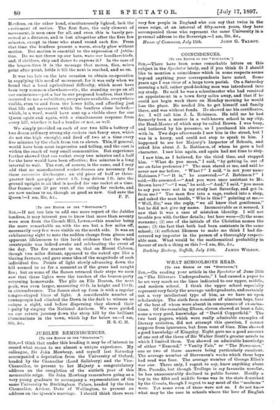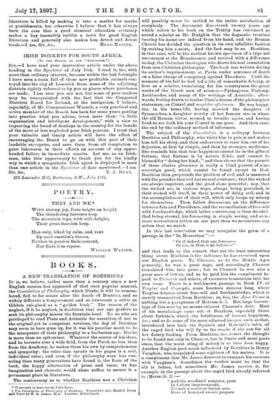WHAT SCHOOLBOYS READ.
[To THE EDITOR OP THE SPECTATOR.'
Sin,—On reading your article in the Spectator of June 26th on "The Illiterate Undergraduate," I had caused a paper to be set very much on the lines indicated to our upper, middle, and modern school. I think the upper school especially represent very fairly the average undergraduate, and certainly not a very intellectual type of him, as we have no open scholarships. The sixth form consists of nineteen boys, four of the best of whom were absent in consequence of examina- tions. Of the remaining fifteen, eleven showed at least a fair, some a very good, knowledge of "David Copperfield." The two best papers, which were really admirable examples of literary criticism, did not attempt this question, I cannot suppose from ignorance, but from want of time. Nine showed a good knowledge of Kingsley. Eight gave me a good account of one out of the three of Sir Walter Scott's greater novels to which I limited them. Ten showed an admirable knowledge of either "Esmond," "Vanity Fair," or "The Newcomee,' one or two of these answers being particularly excellent. The average number of Stevenson's works which these boys had read was four. The average number of George Eliot's was one. Three only, I regret to say, knew anything about Mrs. Proudie, but though Trollope is my favourite novelist, he has unaccountably declined in public favour. Hardly a boy in the fifth and middle forms was in the state described by the Crania, though I regret to say most of the " moderns " were. Yet some even of these were not so. I do not know what may be the case in schools where the love of English
literature is killed by making it into a matter for marks or punishments, but otherwise I believe that it has always been the case that a good classical education certainly makes a boy insensibly imbibe a taste for good English literature and generally also makes him detect and detest



































 Previous page
Previous page